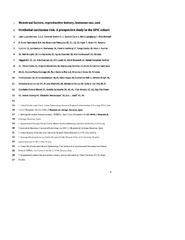Menstrual factors, reproductive history, hormone use, and urothelial carcinoma risk: A prospective study in the EPIC cohort
Permanent lenke
https://hdl.handle.net/10037/20760Dato
2020-05-28Type
Journal articleTidsskriftartikkel
Peer reviewed
Forfatter
Lujan-Barroso, Leila; Botteri, Edoardo; Caini, Saverio; Ljungberg, Börje; Roswall, Nina; Tjønneland, Anne; Bueno-De-Mesquita, Bas; Gram, Inger Torhild; Tumino, Rosario; Kiemeney, Lambertus A.; Liedberg, Fredrik; Stocks, Tanja; Gunter, Marc; Murphy, Neil; Cervenka, Iris; Fournier, Agnès; Kvaskoff, Marina; Häggström, Christel; Overvad, Kim; Lund, Eiliv; Waaseth, Marit; Fortner, Renée T.; Kühn, Tilman; Menéndez, Virginia; Sánchez, María-José; Santiuste, Carmen; Perez-Cornago, Aurora; Zamora-Ros, Raul; Cross, Amanda J.; Trichopoulou, Antonia; Karakatsani, Anna; Peppa, Eleni; Palli, Domenico; Krogh, Vittorio; Sciannameo, Veronica; Mattiello, Amalia; Panico, Salvatore; van Gils, Carla H.; Onland-Moret, N. Charlotte; Barricarte, Aurelio; Amiano, Pilar; Khaw, Kay-Tee; Boeing, Heiner; Weiderpass, Elisabete; Duell, Eric J.Sammendrag
Background: Urothelial carcinoma is the predominant (95%) bladder cancer subtype in industrialized nations. Animal and epidemiologic human studies suggest that hormonal factors may influence urothelial carcinoma risk.
Methods: We used an analytic cohort of 333,919 women from the European Prospective Investigation into Cancer and Nutrition Cohort. Associations between hormonal factors and incident urothelial carcinoma (overall and by tumor grade, tumor aggressiveness, and non–muscle-invasive urothelial carcinoma) risk were evaluated using Cox proportional hazards models.
Results: During a mean of 15 years of follow-up, 529 women developed urothelial carcinoma. In a model including number of full-term pregnancies (FTP), menopausal status, and menopausal hormone therapy (MHT), number of FTP was inversely associated with urothelial carcinoma risk (HR≥5vs1 = 0.48; 0.25–0.90; Ptrend in parous women = 0.010) and MHT use (compared with nonuse) was positively associated with urothelial carcinoma risk (HR = 1.27; 1.03–1.57), but no dose response by years of MHT use was observed. No modification of HRs by smoking status was observed. Finally, sensitivity analyses in never smokers showed similar HR patterns for the number of FTP, while no association between MHT use and urothelial carcinoma risk was observed. Association between MHT use and urothelial carcinoma risk remained significant only in current smokers. No heterogeneity of the risk estimations in the final model was observed by tumor aggressiveness or by tumor grade. A positive association between MTH use and non–muscle-invasive urothelial carcinoma risk was observed.
Conclusions: Our results support that increasing the number of FTP may reduce urothelial carcinoma risk.
Impact: More detailed studies on parity are needed to understand the possible effects of perinatal hormone changes in urothelial cells.


 English
English norsk
norsk